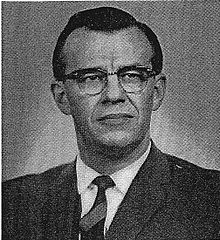Roger Hilsman Jr. | |
|---|---|
 Hilsman during the early 1960s | |
| 8th Assistant Secretary of State for Far Eastern Affairs | |
| In office May 9, 1963 – March 15, 1964 | |
| President | John F. Kennedy Lyndon B. Johnson |
| Preceded by | W. Averell Harriman |
| Succeeded by | William Bundy |
| 2nd Director of the Bureau of Intelligence and Research | |
| In office February 19, 1961 – April 25, 1963 | |
| President | John F. Kennedy |
| Preceded by | Hugh S. Cumming Jr. |
| Succeeded by | Thomas Lowe Hughes |
| Personal details | |
| Born | November 23, 1919 Waco, Texas |
| Died | February 23, 2014 (aged 94) Ithaca, New York |
| Political party | Democratic |
| Spouse | Eleanor Hoyt Hilsman |
| Children | 4, including Hoyt Hilsman |
| Residence(s) | Manhattan, New York Lyme, Connecticut |
| Education | United States Military Academy Yale University |
| Profession | Soldier, statesman, scholar, author |
Roger Hilsman Jr. (November 23, 1919 – February 23, 2014) was an American soldier, government official, political scientist, and author. He saw action in the China-Burma-India Theater of World War II, first with Merrill's Marauders, getting wounded in combat, and then as a guerilla leader for the Office of Strategic Services. He later became an aide and adviser to President John F. Kennedy, and briefly to President Lyndon B. Johnson, in the U.S. State Department while he served as Director of the Bureau of Intelligence and Research in 1961 to 1963 and Assistant Secretary of State for Far Eastern Affairs in 1963 to 1964.
There, Hilsman was a key and controversial figure in the development of U.S. policies in South Vietnam during the early stages of American involvement in the Vietnam War. He was an advocate of a strategy that emphasized the political nature of the conflict as much as the military aspect and was a proponent of the removal from power of South Vietnamese president Ngô Đình Diệm. Hilsman left government in 1964 to teach at Columbia University and retired in 1990. He wrote many books about American foreign policy and international relations. He was a Democratic Party nominee for election to the U.S. House of Representatives in 1972 but lost in the general election.